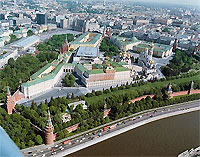Recycling Old Soviet Chestnuts

(opendemocracy.net – Daniel Treisman – May 10, 2013)
Daniel Treisman is a Professor of Political Science at UCLA. His work focuses on the politics and political economy of Russia, and on comparative political economy.
However much the regime might try to plot a new political trajectory, its only success is in intensifying a feeling of drift and improvisation. Unforced errors are typical for the end of authoritarian regimes, says Daniel Treisman, so the Kremlin should be extremely careful.
Although this might change, at present ‘Putin’s New Course’ is neither new nor a course. It consists of setting free the dependents and beneficiaries of the regime to allow them to persecute their enemies with less restraint than before. The overwhelming sense in Moscow is of drift, of no real decisions being made, of repeated improvisations.
Recent initiatives reveal a painful absence of ideas. Old chestnuts are being recycled from the bottom of the Soviet barrel. The ‘Hero of Labour’ medal is coming back along with Soviet-era fitness tests for youths. So are mandatory school uniforms. Policymakers apparently think the country’s most urgent problems are teenagers’ shabby attire and flabby bellies.
In fact, children have been the centre of attention latelyperhaps because the adults have been proving harder to talk to. Never have Russian children been so actively protected. From American families who want to adopt them. From the ‘pro-homosexual propaganda’ with which gay activists supposedly planned to plaster the country. From those strange Moscow protesters with their white ribbons that look like condoms.
Then there is that chestnut of chestnuts the Popular Fronthardly popular, certainly a front. Under its umbrella the same dependents and beneficiaries are already gathering, united by opportunism and mutual dislike. No one in the Kremlin seems to remember what happened the last time this idea was put into service. The various Popular Fronts in Support of Perestroika started out in the late 1980s pretending to back Gorbachev and his regime. Within a couple of years, they were tearing it apart.
All this just makes the President look increasingly out of touch. He is trying to appeal to the mainstream inhabitants of the provinces, the millions of working and lower middle class Russians with traditional values. But he knows less and less about such people. He attacks the pro-Western, celebrity-obsessed, angry urbanites in breaks between entertaining Gerard Depardieu and Steven Seagal.
Putin’s political team is feeling confident. The protest wave that shocked everyone with its scale in December 2011 has since dwindled. Such ups and downs are actually quite common in the last years of authoritarian regimes. Transitions have a wave-like shape. But Kremlin advisors see the decline as vindicating their tactics of the last yeardivide and conquer, minor concessions (which may actually help the incumbents, e.g. the return of single member districts to Duma elections), and what some have taken to calling ‘velvet repression’harassment of NGOs, along with drawn out investigations, searches, arrests, and trials of a few members of the opposition.
Now a key decision looms. Perhaps it has been made already. If Aleksei Navalny is convicted and jailed in the Kirovles case, this may or may not set off mass demonstrations immediately. But it will dramatically accelerate the corrosion of the regime. It will turn a charismatic blogger into a genuine hero, the victim of a bullying state. It will hasten splits within the Kremlin itself, alienating the remaining technocratic wing. It will deepen the growing cultural gap between Russia and the West. The resulting media storm will unnerve investors.
Another key characteristic of authoritarian regimes in their last years is a tendency to make unforced mistakes, a consequence of the information bubble that comes to surround the decisionmaker-in-chief. The Kremlin may be about to make a big one.
Article also appeared at http://www.opendemocracy.net/od-russia/daniel-treisman/recycling-old-soviet-chestnuts bearing the following notice:
 This article is published under a Creative Commons licence. If you have any queries about republishing please contact us. Please check individual images for licensing details.
This article is published under a Creative Commons licence. If you have any queries about republishing please contact us. Please check individual images for licensing details.
